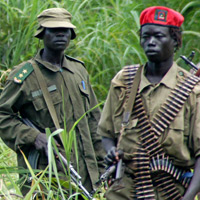
TIME IS OF THE ESSENCE
Dissension, disarray, deaths, and defections within the rebel Lord’s Resistance Army leadership provide a major opportunity for negotiators to pursue a deal with LRA leader Joseph Kony, while simultaneously concluding the negotiations in Juba, South Sudan. LRA defections complicate efforts to finish the hard work of negotiations and the deteriorating Comprehensive Peace Agreement
(CPA) in South Sudan threatens to destabilize the region further. A clear timeline for the remaining steps in the peace process and direct talks through shuttle diplomacy with Kony are necessary to bring
peace to northern Uganda. Ending the conflict in northern Uganda will require focused, effective leadership from the U.S. in support of the broader international and regional efforts. The U.S. can play a key role in preparing a final deal. The time to strike diplomatically—is now.
KEY PLAYERS, EVENTS AND ACRONYMS
Comprehensive Peace Agreement (CPA)—The peace deal signed between Sudan’s government in Khartoum and Southern Sudan helped open a window of opportunity for peace in Northern Uganda. The LRA lost its safe haven in Southern Sudan and
the Government of South Sudan now is playing the role of peace broker and is providing the forum for peace talks in Juba, South Sudan.
DDR—Disarmament, demobilization and reintegration, a critical process for enabling ex-combatants from the Lord’s Resistance Army rebel group to return to their home communities.
Government of South Sudan (GoSS)—Created by the CPA, the Government of South Sudan is interested in creating peace in northern Uganda to ensure security in southern Sudan.
International Criminal Court (ICC)—The ICC has
four outstanding arrest warrants against LRA rebel
commanders, including LRA leader Joseph Kony.
Lord’s Resistance Army (LRA) and Joseph Kony—
The LRA is an exceedingly violent rebel movement led by self-proclaimed messiah, Joseph Kony. Finding a way to deal with Kony remains the key to peace in northern Uganda.
United States—The U.S. can play a key role in preparing a final deal and must play a leadership role in support of broad international and regional efforts. The U.S. is providing financial support and
a special advisor for conflict resolution has been named to support peace efforts, thanks to activist and Congressional pressure.
NEXT STEPS
To keep the peace process focused and moving forward, the following steps are necessary from the Juba negotiators, the UN Special Envoy, and the U.S.:
- Deal directly with Kony on the core issues
- Discipline the Juba process by providing oversight, tight time frames, and financial contraints to prevent the LRA from stalling the peace talks to rebuild the forces.
- Build leverage to use against Kony and the LRA by devloping a fallback military strategy
- Prepare a follow-up process in northern Uganda to address long term issues of resettlement, redevelopment and reconciliation
JUSTICE CONSULTATIONS
A June agreement on reconciliation and accountability obligated the Ugandan government and LRA to conduct consultations with the people of Uganda to tackle reconciling the pursuit of a negotiated
settlement with unexecuted arrest warrants from the International Criminal Court (ICC) against four rebel leaders, including Kony. The Ugandan Government found a diverse array of views on
accountability. Meanwhile, the LRA consultation process has dragged on and no dates have been set for the entire process to end.
CONFUSION AND TURMOIL
The LRA’s deputy commander, Vincent Otti, became suddenly unreachable in October and many speculate that he was murdered by Kony after the two clashed over the direction of the peace process. Adding to the turmoil, Kony snubbed UN Special
Envoy Chissano and the LRA delegation when they attempted to meet in late October. While Kony’s disappearance may make the process more difficult because he was an ideal interlocutor for mediators, it also underscores the short-term weaknesses in
the LRA’s leadership and that the time is hot right now to engage diplomatically.
NARROWING WINDOW OF OPPORTUNITY
Besides cracks in the LRA military leadership, recent developments in Congo and Sudan are creating sources of uncertainties about the peace process.
In Sudan, the signing of the CPA helped open a window of opportunity for peace in northern Uganda because the LRA lost its safe haven in South Sudan and the new party, the Government of
South Sudan, was willing to play the role of peace broker to create security in the South. This window is closing, however, as the Sudanese government in Khartoum will have a strong interest in using the LRA once again as a proxy to destabilize Southern
Sudan if the fragile CPA eventually collapses.
In Congo, rising tensions in North Kivu between the Congolese government and rebel General Laurent Nkunda make it unlikely that the Congolese government will have the resources or capacity to prioritize dealing with the LRA within the next 3 months.

